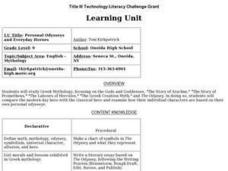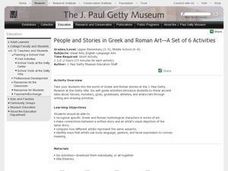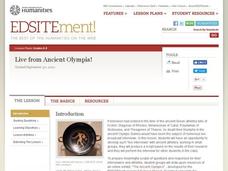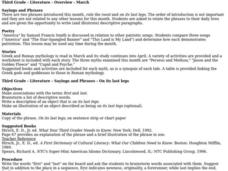Curated OER
Reading Word Recognition, Fluency, and Vocabulary
Eleventh graders analyze words that derive meaning from Greek, Roman, and Norse myths. In this myth vocabulary lesson, 11th graders work in learning groups as visual learners, kinesthetic learners, and artistic learners to identify the...
Curated OER
Vivid Verbs in Writing
Eighth graders explore how to incorporate vivid verbs in their writing. They review action verbs in sentences and view a Power Point presentation discussing possible verbs and their meanings. They view a website and retell a Greek myth...
Curated OER
Personal Odysseys and Everyday Heroes
Ninth graders study Greek Mythology, focusing on Gods and Goddesses. They compare the modern day hero with the classical hero and examine how individual characters are based on their own personal odysseys.
Curated OER
Writing Mythological Narratives
Students compose a creative writing piece based on a painting of a mythological scene. In this creative writing lesson plan, students write about the scene in the painting and tie in their original stories into tales from the life of...
Curated OER
It's All Greek to Us
Students examine the various ways in which ancient Greek culture has influenced modern-day life. They study the context in which modern-day Greeks consider the 2004 Summer Olympics by reading and discussing the article "Where It All...
Curated OER
When in Greece, Do as the Greeks Do
Students examine the contributions of ancient Greeks in this five lesson unit. The explorations reveal how Greece shaped our stories, our modern language, and our society. The study of the Greek myth forms the basis of this unit.
Curated OER
Ancient Greece: The Olympics and the Gods
Research Ancient Greece, the Olympic games, and Greek mythology. Young historians will research Ancient Greece and complete multiple activities about the history and culture. This is a unit of lessons.
Curated OER
Attic Red-Figure Kylix
Learners analyze floral and geometric design. In this art design lesson, students create a circular design art using floral, geometric, or anatomical designs. Learners critique their designs as a group and read the background information...
Curated OER
Norse Mythology
Third graders read several selections of Norse mythology and compare this mythology to others studied in the past. They are introduced to runes. They read poetry and compile a class book of favorite poems. They define idioms and cite...
Curated OER
Using Words as a Way into Rick Riordan's The Lightning Thief
Use the Visual Thesaurus to predict the subject matter of Rick Riordan's book The Lightning Thief. A pre-reading activity encourages middle schoolers to use context clues and word meaning to discover what the book is about. After they...
Curated OER
J. Paul Getty Museum
Young scholars read mythological Greek and Roman stories. In this mythological lesson plan students read mythological stories about Greek and Roman times. As they read, they compare the written story to the visual art of the story.
Curated OER
Mythology in the ESL Classroom
Students study myths, mythological figures, and the ancient classics. They develop a sensitivity to the beliefs, values, attitudes, and views of man's development at that time. They illustrate the powers of each god discussed and...
Curated OER
A PICTURE IS WORTH A THOUSAND WORDS
Students compare and contrast characters from various texts and compile the collected data into several graphic organizers.
Curated OER
Classical Mythological Monsters
Students, after researching and analyzing ancient Greek and Roman mythological monsters, create a monster of their own similar to one they've researched or studied in their class syllabus. In addition, they present their creations to the...
Curated OER
"Building a Word Wall" Roots - The Foundation of Language
Students probe the impact of Greek and Latin on the English language in this ten lesson unit. Root words are analyzed for their origins and displayed on a word wall. Inventions are created using the words and placed in a class museum.
Curated OER
Writing From Mythological Narratives
Students compose a short piece of creative writing based on a painting depicting a mythological narrative. In this creative writing lesson, students create a short piece of writing and then learn more about the mythological scene in the...
Curated OER
Mythical Mayhem
Students explore Greek and Roman mythology in this five lessons unit. Common gods, their roles in the myth and stories of the era are surveyed as students take on the personality of a mythical character.
Curated OER
Being in the Noh: An Introduction to Japanese Noh Plays
Students analyze the conventions used in Noh plays and write an introduction to a Noh play of their own. In this Noh play lesson, students identify the conventions of the Noh form and analyze the realizations the main character achieves....
Curated OER
Live from Ancient Olympia!
Students study online resources to examine the ancient Olympic Games and athletes. They investigate the qualities of ancient Olympic athletes and role interviews with the athletes.
Curated OER
The Minerva Mosaic of the Library of Congress
Students analyze the Minerva mosaic. In this Library of Congress lesson, students conduct primary source analysis of the mosaic as they interpret the symbolism and mythology featured in the mosaic.
Curated OER
Impromptu Speeches
Students formulate an impromptu speech about a given topic. In this public speaking instructional activity, students choose a topic from a deck of pre-written index cards and quickly present an impromptu speech. Students use a rubric to...
Curated OER
Literature
Third graders study phrases, poetry and myths of Ancient Greece and Rome in these lessons.
Curated OER
Sparta and Athens
Sixth graders study Ancient Greece. In this Ancient Greece lesson, 6th graders complete 16 lessons to learn about Ancient Greece. Students complete a quiz for assessment.
Curated OER
A Festival Day In Ancient Greece
Sixth graders present a Greek festival. In this Greek festival lesson, 6th graders experience many facets of an ancient Greek festival. Students in sixth grade present the Greek festival to second grade students.

























